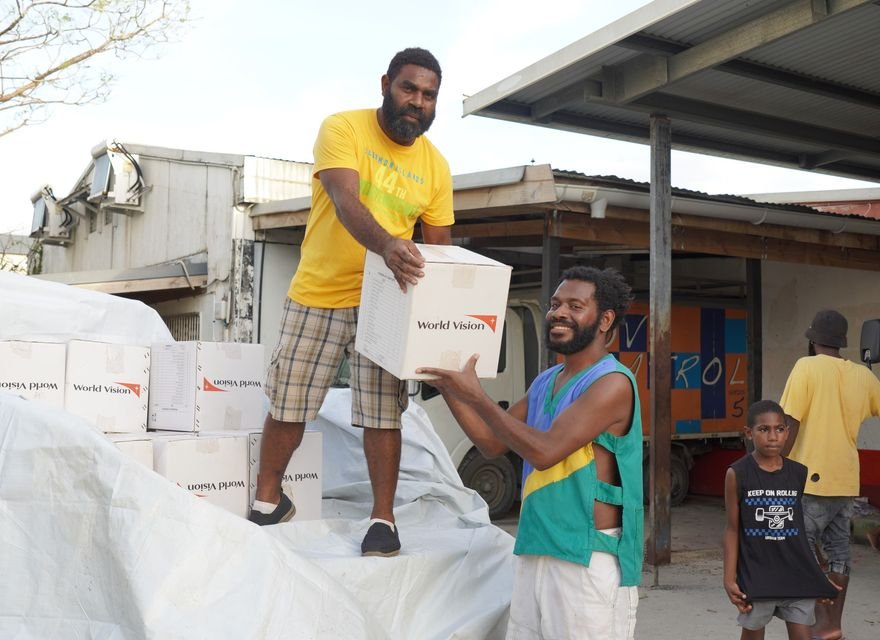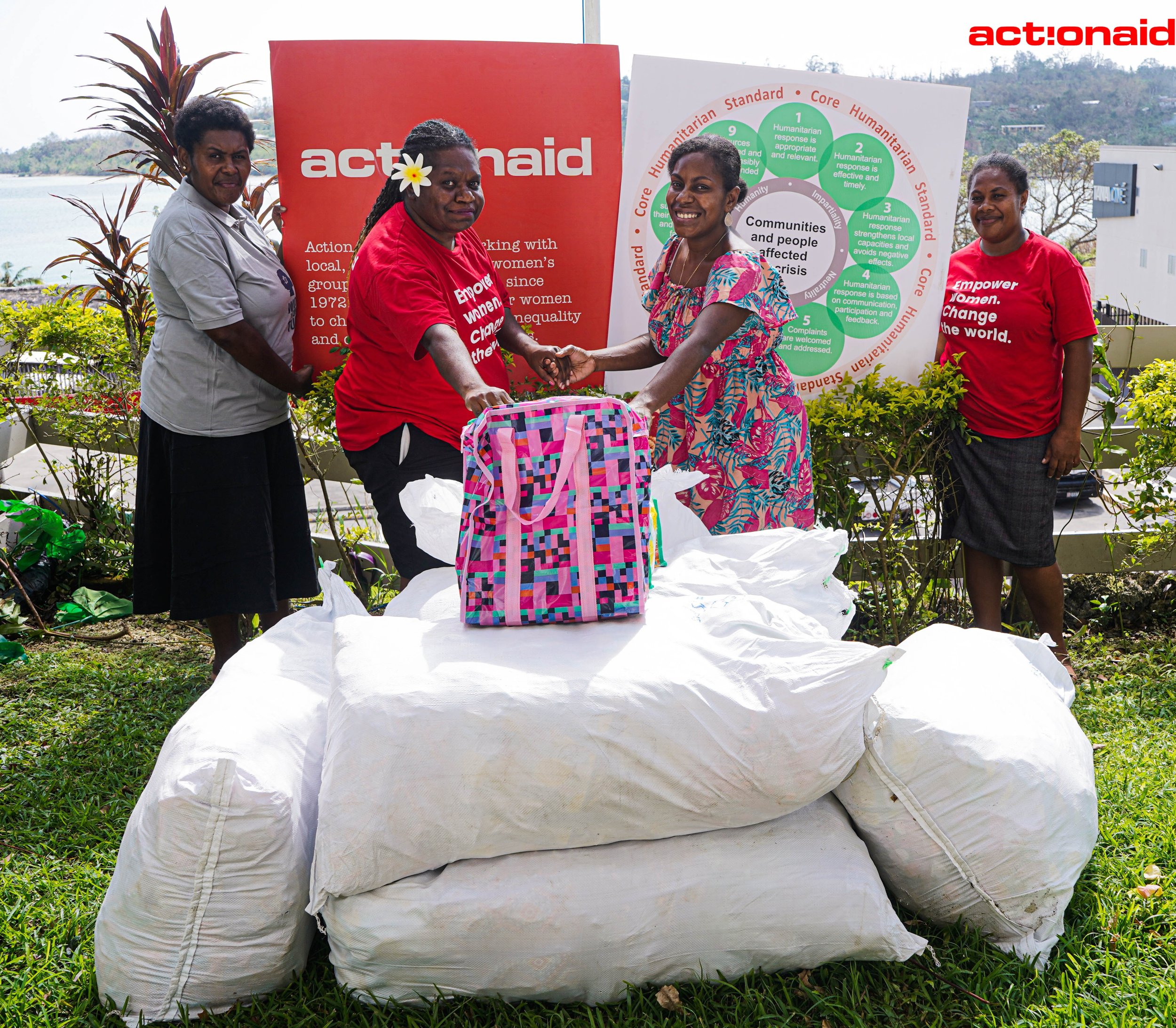Vanuatu – Tropical Cyclones Judy and Kevin
Above: World Vision handing over Family Hygiene Kits to Wan Smol Bag to distribute to community members in their evacuation centre. Photo: World Vision Vanuatu.
In the first three days of March 2023, Vanuatu was hit by two Category 4 cyclones which tracked similar paths across the length of the country, most severely affecting Shefa and Tafea provinces, with some impact in parts of Torba, Sanma, Penama and Malekula.
The cyclones caused widespread damage affecting approximately 80% of the population, as estimated by Vanuatu’s National Disaster Management Office (NDMO). Even though there were no casualties, families lost parts or all their homes, suffered damage or total loss of gardens, and experienced flooding in low-lying areas.
Save the Children supporting with distribution of relief materials at Nukuonapo Community in Teuma Valley. Photo: Elisa Mondou, Save the Children Vanuatu
Above: A mother and her three children receiving shelter and hygiene supplies at a distribution. Photo: Save the Children Vanuatu
Above: Action Aid handing over 100 Dignity Kits to their partner, Vanuatu Young Women for Change, for distribution. Photo: Roslyn Tari, ActionAid Vanuatu.
The AHP Response
The Australian Government announced a package of assistance to the Government of Vanuatu, including AUD $3.35 million for a year-long Australian Humanitarian Partnership activation focusing on the most severely affected areas.
Initial response activities were funded through use of pivoted AHP Disaster READY program funds, and all partners in Vanuatu responded collectively, drawing on the foundations for collaboration, preparedness and response established through the first five years of the AHP Disaster READY program.
Active AHP partners in Vanuatu included Action Aid, CARE, CAN DO, Oxfam, Save the Children and World Vision, all supported by their Australia-based affiliates.
Initial activities focused on the early recovery of affected communities. Working in close coordination and under the leadership of the national government, AHP partners have supported rapid need assessments; procurement, release and distribution of pre-positioned humanitarian supplies; and support to evacuation centres.
Longer-term response and recovery activities included improving nutrition, agriculture, WASH, education, protection mechanisms and livelihoods, with a special focus on vulnerable groups including women, girls, and people with disability and their carers.
Highlights
AHP partners actively coordinated with key partners and stakeholders at the national and provincial levels, such as the National Disaster Management Office (NDMO), Provincial Emergency Operation Centres (PEOCs) and Clusters, and at the local level with implementing partners, community disaster committees and Area Administration (AA) structures. All AHP partners seconded staff members to NDMO to support the Rapid Needs Assessment. CAN DO and World Vision supported the Displacement & Evacuation Centre Management (DECM) Cluster through sharing of Safe n Redi evacuation facility data, evacuation assessment and daily monitoring. CARE and Save the Children co-led the Gender and Protection cluster during the response. CARE also supported the Community Communication and Engagement (CCE) sub-cluster as well as the Shelter Cluster. Save the Children co-led the Education Cluster, coordinating with the Ministry of Education and Training and UNICEF to ensure effective school response and recovery activities.
Around 20 Women i Tok Tok Tugeta (WITTT) network members from East and West Malo, supported by AHP through ActionAid Vanuatu, harvested vegetables and root crops from their subsistence gardens to provide healthy food relief to their sisters and families who were severely affected by the twin cyclones in Shefa and Tafea Provinces, donating 17 tonnes of produce from their own gardens. The freshly picked food items included bananas, casava, taro, yams, wild yams, sweet potatoes, dry coconuts, and vegetable cuttings. The food items were transported on trucks to the boat jetty, and transported on an inter-island ferry, accompanied by WITTT women to Port Vila. The women were met by the Action Aid Response Team who assisted them to unload and the food was later distributed to women and families around Port Vila and East Efate, with some food items shipped and distributed to Tanna and Erromango.
Partners responded to the essential needs of affected communities by distributing shelter kits, hygiene kits, kitchen kits, water tanks, and pre-positioned humanitarian supplies. Partners collectively distributed more than 13,000 supply kits or non-food items. World Vision procured emergency relief supplies locally to assemble 1,000 hygiene kits. While it was more expensive to procure locally, this strategy supported local market recovery and achieved other cost savings including international shipping, which minimised environmental impact. CAN DO improved the water systems in six affected communities, improving access and supply. Save the Children set up Child Friendly Spaces and Temporary Learning Centres within schools, to help children’s learning continue despite the disruption from the cyclones.
This response saw AHP partners placing a heavy emphasis on ensuring that people in communities affected by the cyclones were not only having their physical needs met, but were also aware of and responding to their emotional and psychosocial needs. For example, CAN DO partner ADRA provided training for community members on both psychosocial first aid and psychosocial support. One participant from Mele village shared: "I never really thought about children's trauma during a disaster period as I was preoccupied with concerns about the damage caused to our personal properties. This training has been an eye-opener for me, encouraging me to also consider assisting and caring for my children whenever a disaster strikes again." Save the Children partnered with Wan Smol Bag to conduct an outreach program in communities affected by the cyclones, engaging children in various activities including beach volleyball, tug of war, a newspaper fashion show, team flag painting, and other sports and craft activities.





